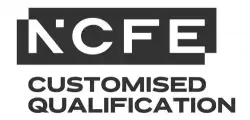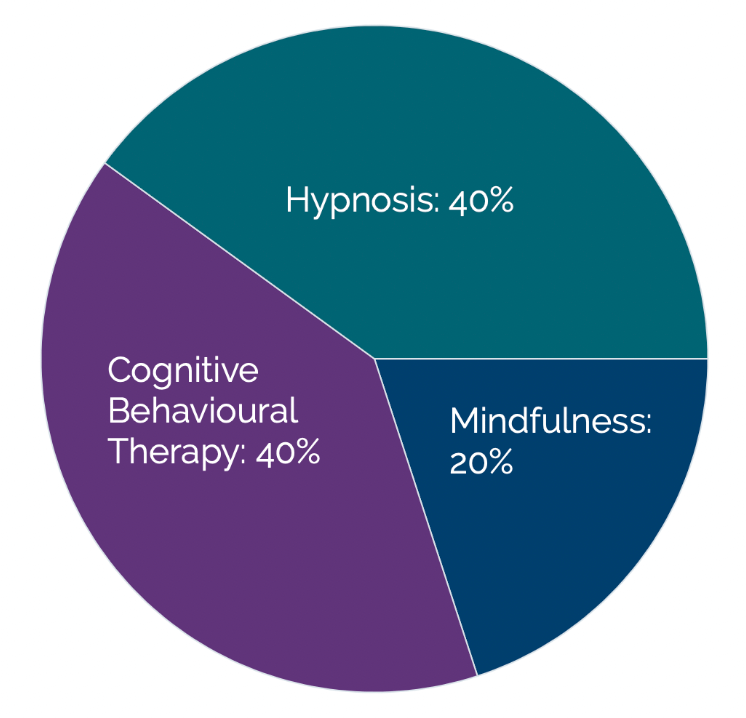The Diploma in Cognitive Behavioural Hypnotherapy:
a fully accredited, practitioner training programme
The UK College runs a special hypnotherapy diploma award called the Diploma in Cognitive Behavioural Hypnotherapy.
This Diploma is based on mainstream peer-reviewed research on hypnosis and psychotherapy.
The Diploma training is designed to meet and exceed all the professional requirements to be a registered hypnotherapist.
This course has been running nearly 20 years and is well-known in the hypnotherapy field and internationally.
To make it highly accessible, the training is available in various formats that allow you to study individually at home in your own time anywhere in the world – or take a more intensive, full time “classroom style” learning.

This externally verified hypnotherapy training course is approved by The British Psychological Society as CPD for psychologists.
The Diploma is externally awarded by NCFE, a non-profit, government-regulated, national examining body, and is verified at Level 4 AND Level 5 using a national framework’s level descriptors. Read more about the different qualifications here.
Note: the Diploma qualification is accepted by all the main professional hypnotherapy organisations: NCH, GHR, FHT, REBHP, ACCPH, ASCH (Australia) and ICBCH (USA).
Starting a new career?
The diploma is designed to provide those new to therapy with the clinical skills, knowledge and a highly accredited diploma that will enable them to set up in practice as a professional hypnotherapist.
Or adding to your skill set?
This course is also popular with psychologists, psychotherapists, psychiatrists and coaches looking to add hypnotherapy to their existing skills.

Re-use that psychology degree?
If you've studied or practice psychology then you'll find the course a really good fit as it's aligned with mainstream psychology theories and concepts. And of course it's based on experimental and clinical research.
However you don't need a background in psychology to take this course.
Students are not required to have any previous experience or training in therapy. In fact, our students come from a wide variety of backgrounds and many go on to be successful hypnotherapists in private practice.
Accreditation
The training programme was carefully designed to meet the accreditation criteria of the main hypnotherapy registers and to lead to registration as a hypnotherapy practitioner.
It is externally accredited and recognised by several of the leading organisations in the field including:
- The British Psychological Society Learning Centre (approved as CPD for psychologists)
- NCFE Accredited Hypnotherapy Diploma (Level 4 and Level 5 equivalency, read more here)
- The General Hypnotherapy Register (GHR)
- The Register for Evidence-Based Hypnotherapy (REBHP)
- The National Council of Hypnotherapy (NCH)
- The Federation of Holistic Therapists (FHT)
- Register of Accredited Counsellors, Coaches, Psychotherapists and Hypnotherapists (ACCPH)
- The Australian Society of Clinical Hypnosis (ASCH)
- The International Certification Board of Clinical Hypnotherapists (ICBCH)
- The Chinese Psychological Society (CPS) (certified as a psychotherapy training by the CPS)
Read more about accreditation hereCountdown Widgets.

Hypnotherapy Diploma Course:
Content and Syllabus
Cognitive Behavioural hypnotherapy (CBH – also sometimes called Cognitive Hypnotherapy) is a popular topic of research in current scientific journals in the field.
There is a growing body of evidence which shows that adding hypnosis to cognitive behavioural therapy improves outcomes compared to CBT alone.
It might be slick to say that adding hypnosis “turbocharges” CBT – but in many ways this is true.
The combined elements of relaxation, focused attention, increased suggestibility, vivid imagery and emotional intensity that are available in hypnosis – creates change more quickly and at deeper and broader levels than “talking therapies”.
Question: How does hypnosis create such profound change?
Answer: During the course we explain and you will experience the profound experiential aspect to hypnosis – it is through experience that we change at “deeper levels” than the conscious mind. How hypnosis creates change at the level of the “unconscious” is something we tackle from a sound psychologically informed approach, focused on the role of imagery in changing the underlying schemas and non-conscious processes that make up our experience of the world and our abilities.
Vocationally Focused Hypnotherapy Training!
This is a vocational training and qualification, so our training focuses on practical face-to-face classroom exercises and group learning with written assessment following completion of the classroom training.
Far too many courses, in our opinion, fill you up with theories and knowledge which have no relevance to the skills you need to have and the choices you need to make in the therapy room with your client! Other courses make a whistle stop tour on every psychological theory in 12 weekends.
Our “spiral learning” approach takes you step by step through a key piece of theory, practical application experience of that concept (in therapist-client pairs), debrief & discussion – and then another chunk of theory, experiential practice, debrief and discussion.
The training is grounded in a “cognitive behavioural approach” (rather than a miss-mash of approaches).. As we spiral around onto the same core concepts and themes you begin to naturally develop a clear, deep, well-integrated way of thinking about therapy and client problems.
Within this cognitive behavioural approach you will learn (and experience!) a wide range of evidence-based techniques – from which to design treatment programmes for your clients.
By the end of the course you will have probably conducted over 30 therapist-client sessions (and received about as many too!)
So you leave the training experienced, knowledgeable, skilled and clear about the key concepts and tasks in hypnotherapy.
“Provides an excellent basis for practising cognitive-behavioural hypnotherapy in a professional and effective manner.
I highly recommend it.””
– Professor Karen Carr PhD, Professor of Psychology, Cranfield University
“I cannot praise this course enough. As someone coming from outside of the therapeutic environment, the Diploma is giving me the tools and confidence to begin working with clients.
The instructors are engaging and knowledgeable and give a huge breadth of information, techniques and personal styles from which students can learn. It is with no exaggeration or hyperbole that I say: this course is life-changing!”
– Verity Kahn PhD, Anthropologist

Diploma Course Content
The Diploma in Cognitive Behavioural Hypnotherapy covers the domains of hypnosis, cognitive behavioural therapies and mindfulness.
The relative proportions of these in the curriculum are presented in the chart. However these are NOT presented as disparate topics – but rather presented as an integrated view of human experience.
We see hypnosis and mindfulness as being at opposite ends of a spectrum with focused attention and hypnotic response to a thought on one end – and detached observation of a thought (mindfulness) on the other.
The course covers a lot of basic CBT theory, knowledge and skills – and shows you how to enhance CBT through the addition of hypnosis and/or mindfulness.
The structure of the training

The Hypnotherapy Diploma training is divided into the following three stages, each of which is repeated several times a year.
The Stage 1 Course focuses on essential nuts and bolts of hypnosis and the core skills of a hypnotherapist.
(Many people tell us that this 7 Day Stage 1 course covers MORE information and in more depth than 20 day hypnotherapy training courses they have taken with other training providers.)
(See our certificate course page for more detailed information on the Stage 1 Course.)
With solid understanding and skills in hypnosis established the Stage 2 Course follows on by focusing on Behavioural Hypnotherapy (Behaviour Therapy techniques and approaches integrated with hypnosis). In this course we focus on helping clients change behaviour as the key target for making change (and using hypnosis to help achieve that).
The Stage 3 Course covers Cognitive Hypnotherapy (Cognitive Therapy approaches and techniques integrated with hypnosis). In this course we are learning how to focus in on client's thoughts, beliefs, rules and assumptions as the key target for making change – and how to use hypnosis to help “restructure” thoughts and beliefs (known as “cognitive restructuring”).
This video gallery couldn't be loaded.
the request to Vimeo failed. the plugin could not retrieve data from the Vimeo API! This resource is restricted in your region.
The training provides a thorough grounding in modern Cognitive Behavioural Hypnotherapy and covers much of mainstream Cognitive Behavioural Therapy (CBT).
However in addition to classical CBT there is a special focus on imagery techniques, imaginal exposure, relaxation training and a deep integration of CBT+Hypnosis+Mindfulness, moreover we have created several special integrative techniques (hypnosis+CBT+Mindfulness) that are unique to our Hypno-CBT® approach.
Moreover the influence of both Greek philosophy, Yoga & Buddhist psychology/philosophy adds an experiential depth and a philosophical/spiritual dimension which enables therapists to engage their clients with deeper issues of life purpose and creating a meaningful well-lived life deeply alive to the power of the present moment and all that it contains.
Diploma Format Options
We now have THREE different ways you can take the Diploma in Cognitive Behaviour Therapy:

Webcast
- Live webcasts held by trainers
- Webcasts take place on set dates
- 7 days for each stage

Online with Tutor
- Study edited course footage at your own pace
- 15 hours of 1-to-1 tutoring
- Supervised Practise Sessions 4 times per week

Blended Learning
- Customise your learning experience to suit you
- A mix of Webcast and Online training
The format options are for those of you who are looking for a full practitioner training that will equip you to become an accredited professional hypnotherapist.
If you only want to watch lectures, read and learn – with no personal tuition, coaching or experiential practice sessions then you may want to consider our fully digital version: the Self-Led Diploma.
Learn a Toolbox of 35 Evidence-Based Hypnotherapy Techniques
The course teaches a wide range of techniques, a “toolbox” of 35 different techniques, that the therapist then draws up on as needed; developing real flexibility as a therapist.
Read about the Hypno-CBT® Toolbox here.
The course teaches a deep, and nearly seamless, integration of hypnosis with Cognitive Behavioural Therapy (including mindfulness). It is not simply some “CBT plus hypnosis”.
(It's important to understand that “trance-based” models of hypnosis are not very compatible with CBT, but “non-state” models of hypnosis are very aligned with CBT).
Students are trained in the theory and skills, while learning basic case conceptualisation and treatment design.
Instead of simply delivering Script A for issue A and Script B for issue B (paint by numbers hypnotherapy)
Or ‘shot-gunning' (just using the MOST powerful technique you know – then if that doesn't work switch to another technique!)…
Our approach has you really thinking like a therapist, gathering information, understanding what is maintaining the problem (why hasn't the problem gone away? what maintains it?) – and then collaboratively, shoulder-to-shoulder with the client, designing and agreeing a treatment plan.
Not too much theory!
Approximately 50 per cent of the course time is dedicated to practical exercises (acting either as therapist or client, or in group work).
You can watch these videos to understand the content of each course (Stage) in the Diploma.
The Stage 1 course can also be taken as a standalone certificate course – and you can read more about the Stage 1 Certificate Course here.
In Stages 2 and 3 the course integrates hypnosis with a wide variety of cognitive and behavioural approaches and techniques, including:
- Stress Inoculation Training (Meichenbaum), [Stage 2 course – Behavioural Hypnotherapy]
- Cognitive Therapy for Anxiety (Clark, Wells and Beck) [Stage 3 course – Cognitive Hypnotherapy]
- Exposure and Desensitation approaches (Wolpe, Lazarus), [Stage 2 course – Behavioural Hypnotherapy]
- Tension Control and Applied Relaxation (Jacobson, Benson, Ost, Borkovec), [Stage 2 course]
- Habit Reversal Training (Nunn and Azrin) [Stage 2 course]
- Aversion Therapy/Stimulus Reconditioning, Thought Stopping, Paradoxical Intention (Salter, Frankl etc) [Stage 2 course]
- Mindfulness Approaches (Perls, Kabat Zinn, Hayes et al) [All three stages]
- Problem Solving Therapy (Nezu, Nezu & D'Zurilla) [Stage 3 course]
- The role & use of imagery in Cognitive Therapy (& in Hypno-CBT) [Stage 2 & Stage 3 Course]
- Rational Emotive Behaviour Therapy (Ellis) [Stage 3 Course – Cognitive Hypnotherapy]
- Assertiveness Training, Authentic Self-Expression and Social Anxiety Models (Salter, Lazarus, Clark & Wells). [Stage 2 & Stage 3 courses]
The main textbooks for the course are:
- Hartland's Medical and Dental Hypnosis 4th Edition
- The Practice of Cognitive Behavioural Hypnotherapy by Donald Robertson (2012)
- Essentials of Clinical Hypnosis by Kirsch & Lynn (2006)
Hypnotherapy Diploma Trainers
Click here for information on the college’s trainers.
Includes our Hypno-CBT® Techniques…
In addition we have developed our own special Hypno-CBT® Techniques, powerful and elegant integrations of cognitive behavioural therapy with hypnosis and mindfulness, which inform the course including:
- Hypno-CBT® Script Writing Process
- Hypno-CBT® ABC Triple Exposure Hypnotherapy
- Hypno-CBT® Tension Release Breathing Method
- Hypno-CBT® Core Self Model
- Hypno-CBT® Unlearning Self-Consciousness Model and Technique (Hypno-CBT® Movie Camera of Awareness)
See the full “toolbox” of techniques that are covered in the course here:
The Hypno-CBT® Toolbox
Why take an “Evidence-Based” Training course?
Firstly, we have an ethical duty to not only believe deeply in our own methods but to have scientific evidence that these methods actually work.
(Belief alone, without evidence, is the domain of religion and the faith healer. Whereas as healthcare practitioners, we are making claims to know something that is based on evidence).
Secondly, if you are switching career, you want to be sure that what you are doing is based on solid research and is regarded as current “best practice” by professionals.
When you start your therapy practice on the solid foundation of evidence it gives you an immediate confidence boost.
In addition you appear highly credible and professional – to clients – AND to doctors and other medical professionals who might want to refer clients to a professional hypnotherapist they can trust.
Evidence-based practice is not meant to replace clinical skill and experience but to supplement and inform it. The interests of the client are paramount.
Every client, however, has the right to expect a high standard of care from their therapist. That includes the expectation that the therapist should be informed with regard to research in his or her field, and basing his or her actions upon a considered interpretation of credible scientific research.
“…. there is an implicit contract between practitioners in psychology and psychiatry and the clients who seek their help. This involves the assumption that the techniques of mental health specialists are based on scientific grounds. ” (Singer, 1974: 5)
Reading this article will give you a good idea of what research tells us about hypnosis and how we can use this to inform and educate our clients.
How can we teach so much in just 21 days (three 7-day stages)?
How can people become effective therapists practising safely and ethically in such a short time?
Key Features of the Diploma
- Evidence-Based with a solid grounding in cognitive behavioural approaches
- Extensive digital course materials are provided to all students (three 300 page course manuals plus over 1200 PowerPoint slides) . Printed materials are available as follows:
– Printed manuals, Powerpoints and pendulum – UK students £150.00. International students price on request.
– Printed Powerpoints and pendulum – UK students £95.00. International students price on request - Leads to the qualification: Level 4 OR Level 5 (you choose) Diploma in Cognitive Behavioural Hypnotherapy
- Full practitioner training: Leading to professional membership, ability to obtain insurance and start practising as a hypnotherapist
- Take the training in your own home (Webcast, Online & Self-Led Formats)
- Learn how to do therapy online (Webcast & Online formats)
- Enrolled as a student of the College for a period of 12 months
- Receive 12 months free membership to the Hypno-CBT® Professional Membership Hub giving you full access to all course material, additional webinars, tutor-led workshops, Psychotherapy.net videos and more. For full benefits click here
Entry requirements
- Students attending the hypnotherapy diploma course must be aged 18 or over
- Students should have no history of criminal convictions or sanctions by professional organisations that might reflect upon their suitability to practice as a therapist
- Students should be sufficiently fluent in spoken English to engage with English-speaking clients
- Students must be in suitable mental health for training, e.g., without a history of psychotic symptoms or current mental health problems of a serious nature, that may impair their ability to act as a therapist.
Click here to view our Course Eligibility Criteria.
Level 4 or Level 5 Qualification
Take this Diploma and then choose whether you want a Level 4 or Level 5 qualification. Read more here
Hypnotherapy Diploma Course Handbook
You can download the current edition of the course handbook for the hypnotherapy diploma award from the link below:
Fees and booking
We have 12-month payment plans available and also longer-term student loans (interest-free).
Other offers and discounts: contact us to find out of there are any current offers or discounts available.

